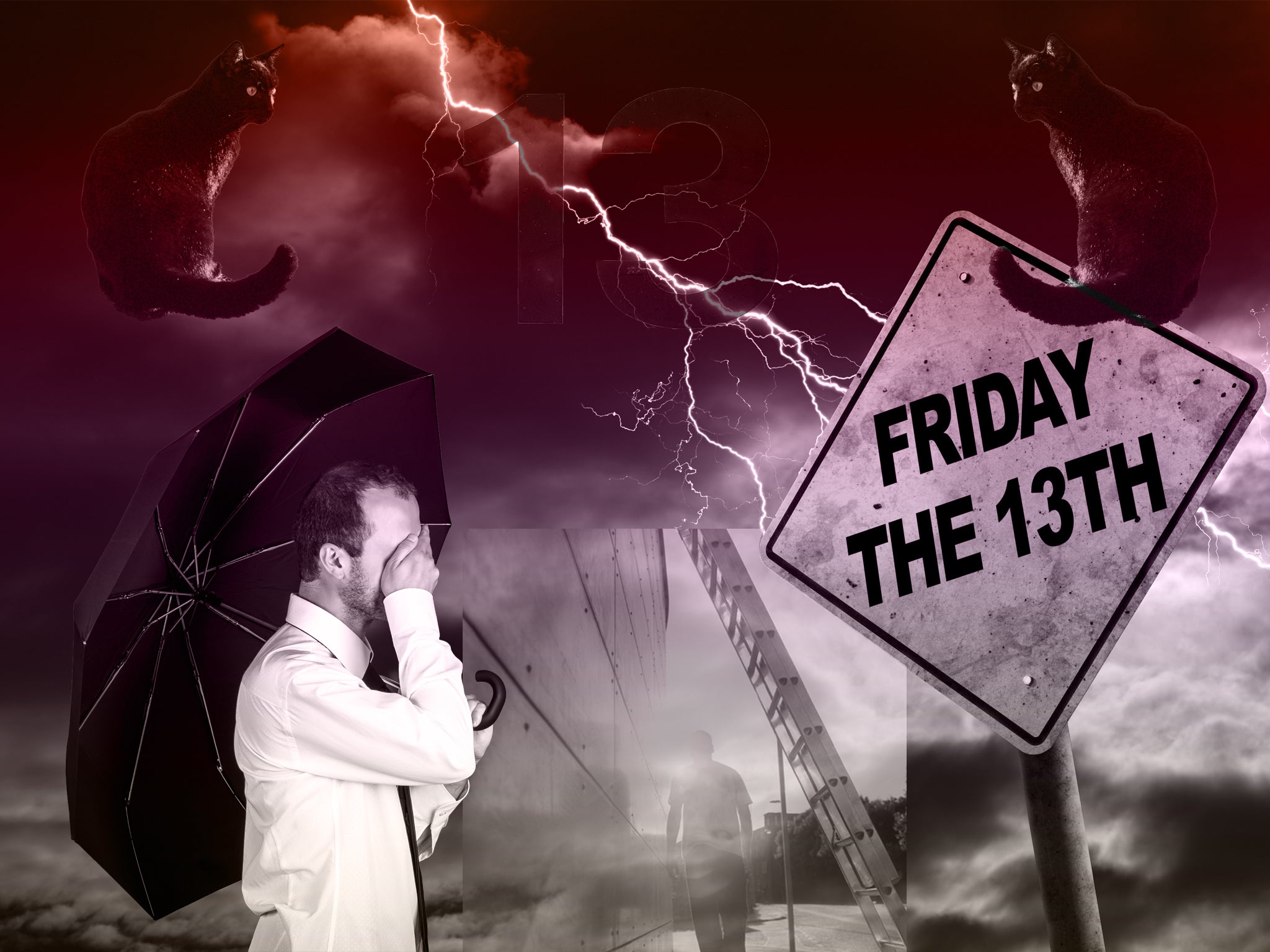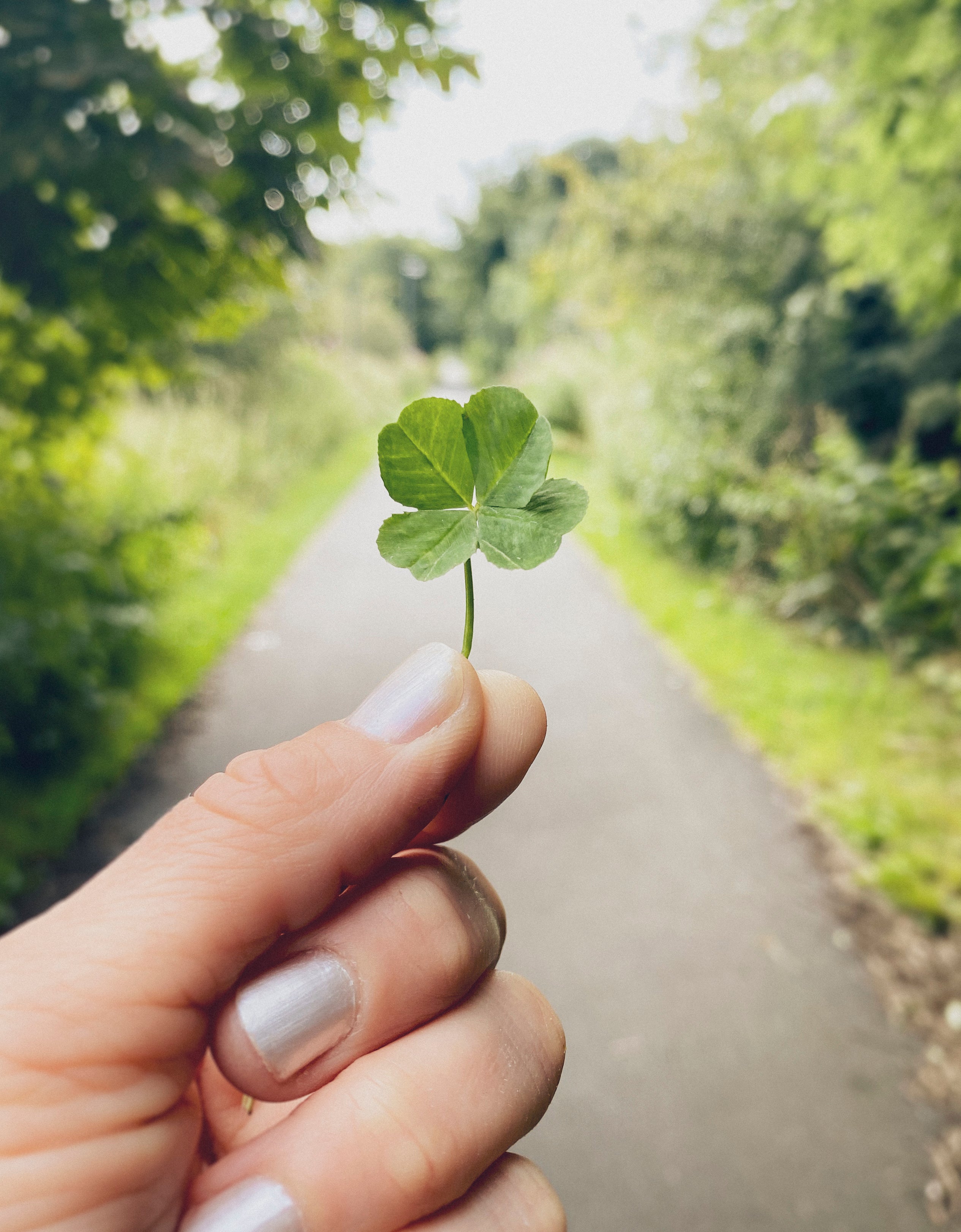Friday the 13th: Does luck really exist or is it just a lot of old superstition?
It’s the day of the year when misfortune is supposed to abound. Can we quantify ‘luck,’ asks David Barnett, and if so can we change it?


If you are of a superstitious bent, then today is really not the day for you. Friday the 13th has always traditionally been associated with bad luck and misfortune, and the wary among you would be best advised to stay in bed.
Things to definitely avoid today would include walking under a ladder propped against a wall, stepping on a cracked paving stone, and allowing a black cat to run across your path. If you really must leave the house, then cross your fingers, carry a four-leafed clover, and touch wood at every opportunity.
But why is Friday the 13th such a horror? According to my trusty copy Zolar’s Encyclopedia of Signs, Omens and Superstitions, Fridays in general have always been thought to be the unluckiest of days, and the following activities should be avoided: getting married, sailing, starting a new job, opening a play, cutting your nails, and changing your bed linen.
Zolar writes: “Should a Friday fall on the 13th of the month it is said to be a doubly bad omen. According to the Romans, the worst possible day for a wedding is Friday the 13th of May.”
But what do we mean by luck anyway? Is it an external force that acts upon our lives? Are some people really more or less lucky than others? Consider Frano Selak, of Croatia, who – depending on your point of view – was either the luckiest or unluckiest man in the world, up to his death in 2015 at the age of (to be fair, a non-too-shabby) 87.
From 1962, Selak had a number of near-misses with the Grim Reaper, beginning with a train crash in which the Sarajevo-Dubrovnik service jumped off the tracks in a canyon and smashed into a river. Some 17 people died but Selak was pulled to safety by an unknown rescuer.
One year later, Selak was on a plane that crashed, costing 19 lives. He landed in a haystack and woke up in the hospital, relatively unharmed. In 1966 he was on yet another train that plunged into a river. In 1970 his car engine blew up on the motorway. Three years later, another car he owned burst into flames.
In 1995 Selak was knocked down by a bus. A year later, he was driving along a mountain pass when a truck came barrelling towards him. He leapt free, unhurt, as his car exploded in the impact.
The display of Selak’s luck wasn’t just his brushes with death. In the 2000s he won the Croatian lottery, some £600,000. He was at that time on his fifth marriage. Insert your own Bernard Manning gag here about whether that was good or bad luck.
Was Selak just in the wrong place at the wrong time? Was it just random happenstance that he found himself almost constantly in peril? Was there something beyond our understanding that put him in those situations, and then got him out unscathed?
Touching wood dates back to pagan rituals that were designed to elicit the help of benign and powerful tree gods. The number 13 is seen as unlucky because there were 13 people at Christ’s last supper
Fortunately, we have Professor Richard Wiseman who has devoted his career to the exploration of luck. He holds Britain’s only Professorship in the Public Understanding of Psychology at the University of Hertfordshire, and, as well as more than 100 academic papers on the subject, he’s written several books including The Luck Factor and 59 Seconds.
Prof Wiseman tells a story to illustrate luck, featuring – what are the chances? – an almost-namesake of mine.
In 1994 Barnett Helzberg Jr was the owner of a chain of successful jewellery stores, a $300m a year business he’d built up himself. He had recently turned 60 and was thinking of selling up and retiring. This day in 1994 he was walking past the Plaza Hotel in New York when he heard a voice call out, “Mr Buffet!”
Warren Buffett was one of the most successful businessmen in the US, an investor and acquirer of companies. And he was walking right next to Helzberg. Seizing the opportunity, Helzberg introduced himself to Buffet and they began talking. A year later, Buffett bought out Helzberg’s business.
A lucky encounter for sure – that Helzberg was walking at the same time and same place as Buffett, and a woman called out to alert him to the fact. Helzberg might never have been breathing the same air as the businessman ever again. But it was Helzberg’s decision to act upon that and introduce himself. In short, we make our own luck, to some extent.
This is something that Prof Wiseman has put to a practical test. He says: “This was a chance opportunity for Helzberg, and people we consider to be lucky consistently encounter such opportunities whereas unlucky people tend not to.”
Prof Wiseman carried out an experiment with a group to see if it was true that some people are more inclined to spot opportunities and act upon them. He gathered together people who considered themselves either lucky or unlucky, and gave each one a copy of a newspaper, with instructions to look through and then tell him how many photographs were printed inside.

Unlucky people took, on average, two minutes to flip through and count all the photos. Lucky people took seconds. Why? Because on page 2 of the paper was a message saying: “Stop counting. There are 43 photographs in this newspaper.”
So those who spotted it were lucky enough to be able to stop there and then. The unlucky didn’t see the notice and went through every page. Prof Wiseman says, “This is because lucky people tend to be more laid back, and open to opportunities. Unlucky people are often more focused on the task at hand, and because of that they don’t see alternative possibilities.
“Lucky people generate their own good fortune via four basic principles. They are skilled at creating and noticing chance opportunities, make lucky decisions by listening to their intuition, create self-fulfilling prophesies via positive expectations, and adopt a resilient attitude that transforms bad luck into good.”
So superstition plays no part in it at all? Only in our attitude towards luck, says Prof Wiseman. People have searched for an effective way of improving their luck for centuries,” he says. “Lucky charms, amulets, and talismans have been found in virtually all civilisations throughout recorded history.

“Touching wood dates back to pagan rituals that were designed to elicit the help of benign and powerful tree gods. The number 13 is seen as unlucky because there were 13 people at Christ’s last supper. When a ladder is propped up against a wall it forms a natural triangle which used to be seen as symbolic of the Holy Trinity. To walk under the ladder would break the Trinity and therefore bring ill fortune.”
There’s just one problem, he says. Superstition doesn’t work. Several experiments have been carried out to test this, some by Prof Wiseman himself. One famous one, by a student called Mark Levin, tested the hypothesis that a black cat crossing your path can change your luck.
Levin asked two people to play a simple coin-tossing game and as they played he sent a black cat walking across them. After several goes at this, Levin concluded that the cat had no effect on the outcome of the games at all.
“I did an experiment with lucky charms,” says Prof Wiseman. “I asked a group of volunteers to measure their levels of life satisfaction, happiness and luck through a questionnaire, then I gave them each a lucky charm I’d bought from a New Age centre and asked them to monitor the effect it had on their lives.
“Overall, there was absolutely no change in terms of how satisfied, happy or lucky they were while carrying the charm. However, a few participants did feel they had been more unlucky during the experiment and were relieved to return the charms.
I believe it’s also important to dissect what we think of as ‘luck’ – are we lucky that we got that opportunity, or is it various privileges at work?
“Superstition doesn’t work because it is based on outdated and incorrect thinking. It comes from a time when people thought that luck was a strange force that could only be controlled by magical rituals and bizarre behaviours.”
But what of those of us who persist in the idea that luck is indeed some kind of supernatural force that acts upon our lives whether we like it or not? Enter Avery Oldershaw, who describes themselves as “an eclectic witch”, with their practice sitting “at the crossroads of folkloric and Chaos magic.” The head of content for two museums and an information centre, they live in Amsterdam. Is luck basically magic?
“Being asked these questions has made me realise that I hardly ever use the word ‘luck’,” says Oldershaw. “When I think of it, I think of the maxims ‘luck favours the prepared, fortune favours the bold’, and ‘you make your own luck’. But I also think of the world in terms of containing various energies, entities, and whatnot, as well as the mundane, that we subjectively experience as being either favourable or unfavourable, depending on what our experience consists of. So perhaps we simply have a semantic difference.”
Oldershaw doesn’t consider themselves to be personally lucky or unlucky: “I’ve had some awful experiences and some wonderful experiences, and I don’t think they happened because of ‘luck’, or because they were ‘meant to happen’; we live in a random and chaotic world, shit happens. But I have managed to deliberately manifest some very specific things I wanted by using my magical practice combined with efforts in the mundane world.”

So it seems that even with magic, we make our own luck, just as we do in the more psychological explanation of the phenomenon.
“Yes, absolutely,” says Oldershaw. “This is the basis of most magic, from putting bay leaves in your wallet to having conversations with your Holy Guardian Angel. But it’s essential to put in the work in the mundane world as much as you can; we have physical forms, operating in a physical realm, and that gives us more agency than anything intangible.
“I believe it’s also important to dissect what we think of as ‘luck’ – are we lucky that we got that opportunity, or is it various privileges at work? Is it ‘bad luck’ that we didn’t get that opportunity, or did we prepare inadequately?”
That’s actually quite close to Prof Wiseman’s summing up of his career investigating luck. “After 10 years of scientific research, my work has revealed a radically new way of looking at luck and the vital role that plays in our lives,” he said. “It demonstrates that much of the good and bad fortune we encounter is a result of our thoughts and behaviour. More importantly, it represents the potential for change, and has produced that most elusive of holy grails – an effective way of increasing the luck people experience in their daily lives.”
So this Friday the 13th, forget the lucky charms and avoiding black cats – get out there and make your own luck by being open to what the world has to offer, is the message.
Join our commenting forum
Join thought-provoking conversations, follow other Independent readers and see their replies
Comments



Bookmark popover
Removed from bookmarks